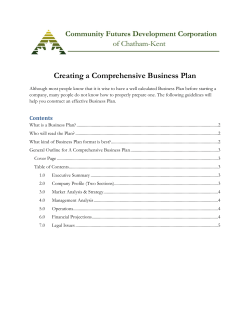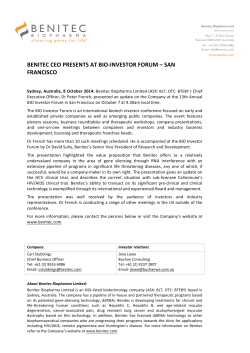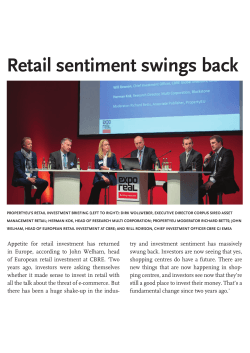
establishing a management investment scheme
CLIENT BRIEFING PAPER 2013 BROSO ASSOCIATES LAWYERS ESTABLISHING A MANAGEMENT INVESTMENT SCHEME IN AUSTRALIA CONSIDERATIONS FOR INVESTMENT MANAGERS BROSO ASSOCIATES LAWYERS This Client Briefing Paper provides a general overview of some of the legal and procedural issues involved in establishing a retail (registered) or wholesale (unregistered) managed investment scheme in Australia. It is intended to be introductory in nature and does not consider all of Australian financial services law, which is as voluminous as it is complex. Broso Associates has considerable experience in advising and representing investment managers in relation to the establishment of both retail and wholesale funds across a broad range of asset classes. We would be more than happy to provide further information regarding the topics and issues covered in this Client Briefing Paper. If you have queries regarding establishing a registered or unregistered managed investment scheme, or obtaining an Australian Financial Services Licence please contact Benjamin Broso on +61 424 796 563 or at benjamin.broso@brosoassociates.com. 2 OVERVIEW OF THIS CLIENT BRIEFING PAPER THIS CLIENT BRIEFING PAPER PROVIDES A GENERAL OVERVIEW OF SOME OF THE LEGAL AND PROCEDURAL ISSUES INVOLVED IN ESTABLISHING A RETAIL (REGISTERED) OR WHOLESALE (UNREGISTERED) MANAGED INVESTMENT SCHEME IN AUSTRALIA. The Client Briefing Paper covers: • the circumstances that determine whether a fund will need to be registered or not; • on overview of the difference between wholesale and retail clients; • the requirements for the marketing of a registered managed investment scheme through a Product Disclosure Statement; and • the practical aspects of marketing a wholesale managed investment scheme through an Information Memorandum. WHO THIS CLIENT BRIEFING PAPER WILL ASSIST? The Client Briefing Paper will assist: • Chief Investment Officers, portfolio managers and other asset managers; • investment advisors, financial planners and stockbrokers who regularly provide their clients with PDSs and Information Memoranda; and • promoters of pooled investment vehicles who require a broad overview of their obligations under the Australian financial services law, in particular under the Corporations Act. 3 CONTENTS 6INTRODUCTION 7 RETAIL VS. WHOLESALE CLIENTS 8 REQUIREMENTS FOR REGISTERED FUNDS 9 PRODUCT DISCLOSURE STATEMENTS 10 REQUIREMENTS FOR UNREGISTERED FUNDS 11 IS AN AUSTRALIAN FINANCIAL SERVICES LICENCE (AFSL) REQUIRED? 4 INTRODUCTION Investment managers, irrespective of the asset class they specialise in, face a labyrinthine legislative and regulatory environment when they come to establish their first fund or managed investment scheme. (Note: the terms fund and managed investment scheme will be used interchangeably throughout this briefing paper). Foreign investment managers should be aware that Australian funds have historically been established either as unit trusts or limited partnerships (LPs). However the use of LPs has now all but disappeared with changes to Australian tax laws treating LPs as companies rather than as partnerships. Ordinarily, the major decision for the investment manager will be whether to establish a registered or unregistered managed investment scheme. This will be determined by whether the investment manager intends to market their fund to retail investors in addition to or in preference to wholesale investors. It is preferable from a cost perspective, and particularly if it is the investment manager’s first fund, to establish an unregistered managed investment scheme rather than registered managed investment scheme. INVESTMENT MANAGERS, IRRESPECTIVE OF THE ASSET CLASS THEY SPECIALISE IN, FACE A LABYRINTHINE LEGISLATIVE AND REGULATORY ENVIRONMENT WHEN THEY COME TO ESTABLISH THEIR FIRST FUND OR MANAGED INVESTMENT SCHEME. 5 RETAIL VS. WHOLESALE CLIENTS A financial product or financial service is provided to a person as a retail client unless any of the following apply: • the price for the provision of the product, or the value of the product to which the service relates, equals or exceeds • AU$500,000; the product or service is provided for use in connection with a business that is not a small business; (Note: section 761G(12) of the Corporations Act defines a small business as a business employing less than: • (i) if the business is or includes the otherwise (ii) manufacture of goods - 100 people; or - 20 people. the person who acquires it provides a copy of a certificate given within the preceding 2 years by a qualified accountant that states that the person has AU$2.5M or has a gross income 2 financial years of at least net assets of at least for each of the last AU$250,000; or • the person is a professional investor. FAILING TO REGISTER A MANAGED INVESTMENT SCHEME THAT IS REQUIRED TO BE REGISTERED IS A CRIMINAL OFFENCE PUNISHABLE BY A FINE OF AU$22,000 AND/OR IMPRISONMENT FOR UP TO 5 YEARS FOR INDIVIDUALS AND A FINE OF AU$110,000 FOR BODIES CORPORATE. (Note: a professional investor means (among other things) an investor who has or controls gross assets of at least AU$10M (including any assets held by an associate or under a trust that the person manages)). Where any of these exceptions apply the financial product or financial service is provided to a person as a wholesale client. Section 601ED(2) of the Corporations Act provides that if all of the interests in a managed investment scheme will be issued to clients classified above as wholesale clients, then the managed investment scheme does not need to be registered. Determining whether or not the fund will be marketed to retail clients from the outset is extremely important. Failing to register a managed investment scheme that is required to be registered is a criminal offence pursuant to section 1311 of the Corporations Act, punishable by a fine of AU$22,000 and/or imprisonment for up to 5 years for individuals and a fine of AU$110,000 for bodies corporate. 6 REQUIREMENTS FOR REGISTERED FUNDS If the fund will be marketed to (and interests in the fund issued to) retail clients then not only will the fund need to be registered with ASIC, but the following will also apply: • Responsible Entity which is a AFSL authorising it to operate a managed investment scheme; the fund must have a public company that holds an • Responsible Entity must have net tangible assets 0.5% of the value of the assets of all managed investment schemes it operates, subject to a minimum requirement of AU$50,000 and a maximum requirement of AU$5M; the of at least • the fund must have a Constitution that meets 601GB of the the requirements of ss601GA and Corporations Act; • the fund must have a Compliance Plan that meets the requirements of s601HA,which includes the establishment of a compliance committee and ensuring that the compliance committee functions properly; and • audit arrangements must be in place in relation to the Compliance Plan that will satisfy the requirements of s601HG, which requires the auditor of a compliance plan to notify ASIC in writing as soon as possible if the auditor has reasonable grounds to suspect that a contravention of the Corporations Act has occurred. The document under which interests in a registered managed investment scheme is marketed and distributed is a Product Disclosure Statement (PDS). The PDS must be lodged with ASIC and the Corporations Act requirements for the content of PDSs are quite prescriptive. 7 PRODUCT DISCLOSURE STATEMENTS Section 1013D of the Corporations Act provides that a PDS must include the following statements, and such information as would reasonably be required for the purpose of making a decision, as a retail client, whether to acquire the financial product, including the following: • a statement setting out the name and contact details of the issuer of the financial product (i.e. the interests in the registered funds); • information about any significant benefits to which a holder of the interests (the retail investor) will or may become entitled, the circumstances in which and times at which those benefits will or may be provided, and the way in which those benefits will or may be provided; • information about any significant risks associated with holding the interests in the registered fund; • if the interests will or may generate a return to the investor - information about any commission, or other similar payments, that will or may impact on the amount of such a return; • information about any other significant characteristics or features of the interests in the fund or of the rights, terms, conditions and obligations attaching to those interests; • information about the dispute resolution system that covers complaints by holders of the interests and about how that system may be accessed by those investors; • general information about any significant taxation implications of holding interests in the registered fund; • if the interests in the fund have an investment component - the extent to which labour standards or environmental, social or ethical considerations are taken into account in the selection, retention or realisation of the investment. As a matter of formality, section 1015C of the Corporations Act stipulates that a PDS may be printed or in electronic form and must be: • given to the investor, or to the investor’s agent, personally; • or sent to the investor, or the investor’s agent, at an address (including an electronic address) or fax number nominated by the investor or the investor’s agent. 8 REQUIREMENTS FOR UNREGISTERED FUNDS If the fund will only be marketed to wholesale clients then there will be no need to register the fund with ASIC, however investment managers should consider the following: • PDS, ordinarily Memorandum will be prepared and distributed to prospective investors; while there is no requirement for a an Information • the Information Memorandum is not required to be lodged ASIC and is not a public document. However it should still be prepared with a high degree of care and skill. Usually it is prepared as a Confidential Information Memorandum and with a prospective investor may in addition be required to execute a Non-Disclosure Agreement prior to being granted access to the document; • investment managers preparing an Information Memorandum need to be extremely careful that the document does not contain any misleading or deceptive statements; • due the sophisticated nature of the investors to whom the document is distributed, it is customary for the Information Memorandum to include a detailed section on the Australian (and International if necessary) tax implications of holding and disposing of interests in the fund; • extreme care should be taken with any financial projections included in the document which, if incorrect, may give rise to legal action on the part of the investors. Investment managers should be aware of the following matters in relation to any projections they include in an Information Memorandum: • when an investment manager makes a representation with respect to any future matter and the investment manager does not have reasonable grounds for making the representation, the representation is ordinarily taken to be misleading; • financial projections which are honestly made by a investment manager and based on reasonable grounds are not misleading just because they do not come to pass; • financial projections by an investment manager may be misleading if: (i) the investment manager does not believe in the (ii) there is no objectively reasonable basis for the projections or is recklessly indifferent to the truth of the projections; or projections; or (iii) there are important assumptions underlying the financial projections or qualifications to which the projections are subject that are not expressed in the Information Memorandum. An Information Memorandum should not be circulated to any investors without a legal review of the document, insertion of all relevant legal disclaimers and legal sign-off. 9 IS AN AUSTRALIAN FINANCIAL SERVICES LICENCE (AFSL) REQUIRED? In respect of registered managed investment schemes, the following matters should be taken into account by the investment manager: • the responsible entity of a registered managed investment scheme must be a public company that holds an AFSL authorising it to operate a managed investment scheme; • the investment manager may require an AFSL in order to authorise advising on or dealing in interests in the fund if it is carried out with sufficient system, repetition and continuity to constitute a financial services business; • in relation to what amounts to a financial services business, in the decision in ASIC v McNamara (2002) 42 ACSR 488 it was determined that the offering of units in a managed investment scheme to only 55 investors was sufficiently “systematic, repetitious and continuous” that the operator of the fund was required to be licensed; • if the operation of a managed investment scheme involves dealing in financial products other than the interests in the fund with sufficient system, repetition and continuity to constitute a financial services business, the investment manager may require an AFSL authorising dealing in those financial products. In respect of an unregistered managed investment scheme, investment managers need to consider the following: • interests in an unregistered managed investment scheme that is exempt from registration under s601ED(2) are still financial products and therefore the investment manager may need an AFSL to advise on or deal in interests in the managed investment scheme if the advice or dealings are done with sufficient system, repetition and continuity to constitute a financial services business; • if the operation of a managed investment scheme involves dealing in financial products other than the interests in the fund with sufficient system, repetition and continuity to constitute a financial services business, the investment manager may need an AFSL authorising dealing in those financial products; • if the managed investment scheme holds financial products, the trustee or custodian of the fund may require an AFSL that authorises it to provide a custodial or depository service. 10 Mergers + Acquisitions Funds Management Financial Services Compliance Corporate Advisory Cross-Border Transactions Equity Financing Capital Raising Venture Capital Takeovers + Reconstructions Contract Negotiation Foreign Inbound Investment FIRB Compliance Joint Ventures Incorporated Alliances Brand Protection Intellectual Property Enforcement Company Secretariat ASIC Compliance Corporate Governance Film + Television Post-Production + Digital Media Talent Management Employment + Industrial Disputes Asset Protection Commercial Litigation Dispute Resolution
© Copyright 2025









